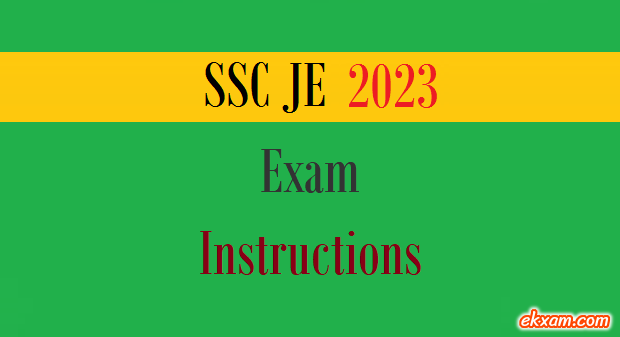Advertisements
Ratings
SSC JE Syllabus
Electrical Engineering
SSC 2020 Syllabus – JE (Electrical Engineering) – Staff Selection Commission (SSC) conducts JE (Junior Engineering) Examination every year for recruitment of junior engineers (JEs) for different-different government departments.
The recruitment of SSC JE is done in three branches of engineering – Electrical, Civil and Mechanical Engineering.
SSC Junior Engineering (SSC-JE) exam has two papers – Paper-I and Paper-II. Candidates appearing for SSC JE exam should be aware of SSC JE syllabus along with the important topics. In this article, we have provided detailed SSC JE Syllabus for Electrical Engineering.
Contents
Paper Pattern
| Papers | Mode of Examination | Subject | No. of Questions | Maximum marks | Duration & Timings |
| Paper-I (Objective Type) | Computer Base Examination | (i) General Intelligence and Reasoning (ii) General Awareness (iii) Part-A General Engineering (Civil & Structural) or Part-B General Engineering (Electrical) or Part-C General Engineering (Mechanical) | 50 50 100 | 50 50 100 | 2 Hours |
| Paper-II (Descriptive Type) | Written Examination | Part-A General Engineering (Civil & Structural) or Part- B General Engineering (Electrical) or Part-C General Engineering (Mechanical) | 300 | 2 Hours |
Paper-I – Syllabus
(1) General Intelligence & Reasoning :
The Syllabus for General Intelligence would include questions of both verbal and non-verbal type.
The test may include questions on analogies, similarities, differences, space visualization, problem solving, analysis, judgment, decision making, visual memory, discrimination, observation, relationship concepts, arithmetical reasoning, verbal and figure classification, arithmetical number series, etc.
The test will also include questions designed to test the candidate‟s abilities to deal with abstract ideas and symbols and their relationships, arithmetical computations and other analytical functions.
(2) General Awareness :
Questions will be aimed at testing the candidate‟s general awareness of the environment around him/ her and its application to society.
Questions will also be designed to test knowledge of current events and of such matters of everyday observations and experience in their scientific aspect as may be expected of any educated person.
The test will also include questions relating to India and its neighbouring countries especially pertaining to History, Culture, Geography, Economic Scene, General Polity and Scientific Research, etc.
(3) General Engineering : Electrical Engineering :
Basic concepts, Circuit law, Magnetic Circuit, AC Fundamentals, Measurement and Measuring instruments, Electrical Machines, Fractional Kilowatt Motors and single phase induction Motors, Synchronous Machines, Generation, Transmission and Distribution, Estimation and Costing, Utilization and Electrical Energy, Basic Electronics.
Paper-II – Syllabus
(1) Electrical Engineering :
Basic concepts : Concepts of resistance, inductance, capacitance, and various factors affecting them Concepts of current, voltage, power, energy and their units
Circuit law : Kirchhoff‟s law, Simple Circuit solution using network theorems
Magnetic Circuit : Concepts of flux, mmf, reluctance, Different kinds of magnetic materials, Magnetic calculations for conductors of different configuration eg straight, circular, solenoidal, etc Electromagnetic induction, self and mutual induction
AC Fundamentals: Instantaneous, peak, RMS and average values of alternating waves, Representation of sinusoidal wave form, simple series and parallel AC Circuits consisting of RL and C, Resonance, Tank Circuit Poly Phase system – star and delta connection, 3 phase power, DC and sinusoidal response of R-Land R-C circuit
Measurement and measuring instruments: Measurement of power (1 phase and 3 phase, both active and re-active) and energy, 2 wattmeter method of 3 phase power measurement Measurement of frequency and phase angle Ammeter and voltmeter (both moving oil and moving iron type), extension of range wattmeter, Multimeters, Megger, Energy meter AC Bridges Use of CRO, Signal Generator, CT, PT and their uses Earth Fault detection
Electrical Machines : (a) DC Machine – Construction, Basic Principles of DC motors and generators, their characteristics, speed control and starting of DC Motors Method of braking motor, Losses and efficiency of DC Machines (b) 1 phase and 3 phase transformers – Construction, Principles of operation, equivalent circuit, voltage regulation, OC and SC Tests, Losses and efficiency Effect of voltage, frequency and wave form on losses Parallel operation of 1 phase /3 phase transformers Auto transformers (c) 3 phase induction motors, rotating magnetic field, principle of operation, equivalent circuit, torque-speed characteristics, starting and speed control of 3 phase induction motors Methods of braking, effect of voltage and frequency variation on torque speed characteristics
Fractional Kilowatt Motors and Single Phase Induction Motors: Characteristics and applications
Synchronous Machines : Generation of 3-phase emf armature reaction, voltage regulation, parallel operation of two alternators, synchronizing, control of active and reactive power Starting and applications of synchronous motors
Generation, Transmission and Distribution : Different types of power stations, Load factor, diversity factor, demand factor, cost of generation, inter-connection of power stations Power factor improvement, various types of tariffs, types of faults, short circuit current for symmetrical faults Switchgears – rating of circuit breakers, Principles of arc extinction by oil and air, HRC Fuses, Protection against earth leakage / over current, etc Buchholtz relay, Merz-Price system of protection of generators & transformers, protection of feeders and bus bars Lightning arresters, various transmission and distribution system, comparison of conductor materials, efficiency of different system Cable – Different type of cables, cable rating and derating factor
Estimation and costing : Estimation of lighting scheme, electric installation of machines and relevant IE rules Earthing practices and IE Rules.
Utilization of Electrical Energy : Illumination, Electric heating, Electric welding, Electroplating, Electric drives and motors.
Basic Electronics : Working of various electronic devices eg P N Junction diodes, Transistors (NPN and PNP type), BJT and JFET Simple circuits using these devices.
MCQSeries
| 1. | ENGINEERING SUBJECTS | |
| 1. | Electronics Engineering » | |
| 2. | Communication Engineering » | |
| 3. | Electrical Engineering » | |
| 4. | Instrumentation Engineering » | |
| 5. | General Engineering » | |
| 6. | Engineering Mathematics » | |
| 2. | NON-ENGINEERING SUBJECTS | |
| 1. | General English » | |
| 2. | General Knowledge » | |
| 3. | General Hindi » | |
| 4. | General Computer » | |
| 5. | Verbal Reasoning » | |
| 6. | Non-Verbal Reasoning » | |
| 7. | Quantitative Aptitude » | |
| 3. | SCIENCE SUBJECTS | |
| 1. | Physics » | |
| 2. | Chemistry » | |
| 3. | Biology » | |
| 4. | Environmental Science » |
| SSC JE Guide Books |
SSC JE Total Information & Guidance
| 1. | SSC JE 2023 Notification » | |
| 2. | SSC JE 2023 Paper Pattern » | |
| 1. | SSC JE Civil » | |
| 2. | SSC JE Mechanical » | |
| 3. | SSC JE Electrical » | |
| 3. | SSC JE 2023 Syllabus » | |
| 1. | SSC JE Civil » | |
| 2. | SSC JE Mechanical » | |
| 3. | SSC JE Electrical » | |
| 4. | SSC JE 2023 Reference Books » | |
| 1. | SSC JE Civil » | |
| 2. | SSC JE Mechanical » | |
| 3. | SSC JE Electrical » | |
| 5. | SSC JE Previous Years Papers » | |
| 6. | SSC JE 2023 Admit Card » | |
| 7. | SSC JE Cut-off Marks » | |
| 8. | SSC JE Free Mock Tests » | |
| 9. | SSC JE FAQs » |
Click below given links to get further information.
SSC Syllabus JE Electrical Engineering FAQs2
What is the syllabus for the SSC JE exam in Electrical Engineering?
The SSC JE syllabus for Electrical Engineering includes various topics such as Basic Concepts, Circuit Theory, Electrical Machines, Power Systems, Measurement and Measuring Instruments, Electrical and Electronic Devices, Control Systems, and Utilization of Electrical Energy, among others.
What topics are covered in Basic Concepts under the SSC JE Electrical Engineering syllabus?
Basic Concepts topics include Electrical Circuits, Ohm's Law, Kirchhoff's Laws, Magnetic Circuits, Faraday's Laws of Electromagnetic Induction, Transformers, and Electrical Power and Energy.
What are the important topics covered in Circuit Theory under the SSC JE Electrical Engineering syllabus?
Important topics in Circuit Theory include Network Analysis, Network Theorems, Resonance, Transient Response of RL, RC, and RLC Circuits, Two-port Networks, and Filters.
What topics are included in Electrical Machines under the SSC JE Electrical Engineering syllabus?
Electrical Machines topics include DC Machines, Transformers, Synchronous Machines, Induction Motors, Fractional Horsepower Motors, and Special Machines.
What are the important topics covered in Power Systems under the SSC JE Electrical Engineering syllabus?
Important topics in Power Systems include Power Generation Concepts, Transmission and Distribution Systems, Power Factor Improvement, Load Flow Studies, Fault Analysis, and Voltage Stability.
What topics are included in Measurement and Measuring Instruments under the SSC JE Electrical Engineering syllabus?
Measurement and Measuring Instruments topics include Measurement of Voltage, Current, Power, Energy, and Power Factor, Analog and Digital Instruments, Measurement Error Analysis, and Instrument Transformers.
What are the important topics covered in Control Systems under the SSC JE Electrical Engineering syllabus?
Important topics in Control Systems include Feedback Principles, Block Diagrams, Signal Flow Graphs, Time Response Analysis, Frequency Response Analysis, Stability Analysis, and Compensation Techniques.
What topics are included in Utilization of Electrical Energy under the SSC JE Electrical Engineering syllabus?
Utilization of Electrical Energy topics include Illumination, Electric Heating, Electric Welding, Electric Traction, and Electric Drives.
What topics are covered in Electrical and Electronic Devices under the SSC JE Electrical Engineering syllabus?
Electrical and Electronic Devices topics include Semiconductor Physics, Diodes, Transistors, Operational Amplifiers, Digital Electronics, and Communication Systems.
Are there any other important topics to consider for the SSC JE Electrical Engineering exam?
Apart from the mentioned topics, candidates should also focus on Electrical Safety, Earthing, Electrical Estimation and Costing, and Basic Electronics in order to have a comprehensive preparation for the SSC JE exam in Electrical Engineering. Please note that the SSC JE syllabus is comprehensive, and the topics mentioned above are not an exhaustive list. It's advisable to refer to the official SSC notifications and website for the detailed and updated syllabus for the SSC JE exam in Electrical Engineering. Remember that the information provided is based on the knowledge available up until September 2021, and it's always a good idea to check for any updates from the official sources.



